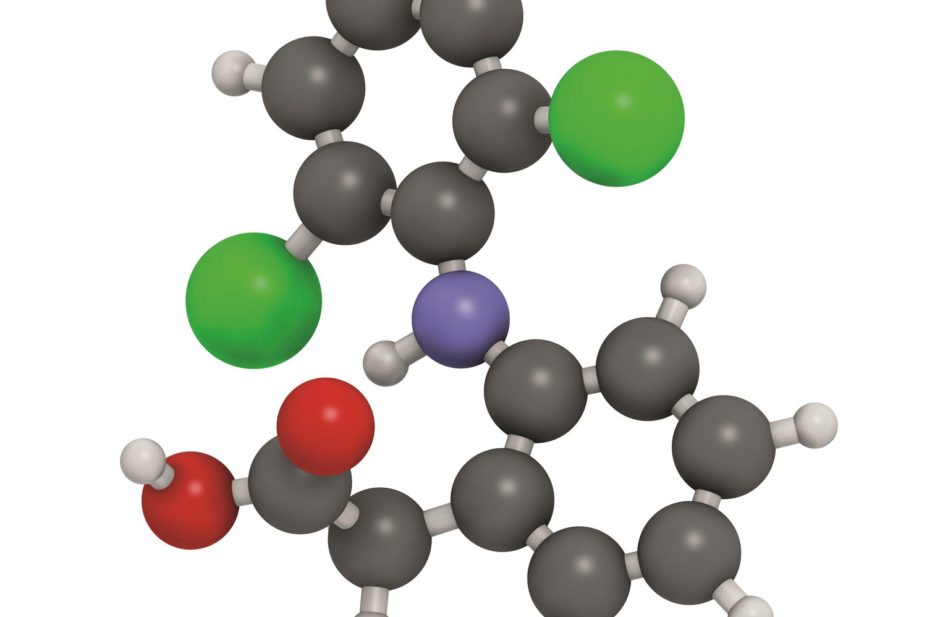
molekuul.be / Alamy
Oral diclofenac tablets, which are used for short-term pain relief, will no longer be available as an over-the-counter (OTC) pharmacy medicine in the UK from 15 January 2015 because of a small risk of heart problems, the Medicines and Healthcare products Regulatory Agency (MHRA) has announced.
Diclofenac was switched to a pharmacy (P) medicine in 2008, but in August 2013, the MHRA consulted on whether it should revert to a prescription-only medicine (POM) following a European review that found there was a small but significant increased risk of cardiovascular side effects associated with the drug.
Subsequently, the UK’s Commission on Human Medicines (CHM) looked at the data and concluded that these side effects cannot be ruled out even when diclofenac is taken for a short time or at a lower dose, and advised that it is no longer suitable as a P medicine.
“Out of 1,000 patients allocated to diclofenac, three more major vascular events [were seen] compared to placebo,” says Sarah Branch, the deputy director of vigilance and risk management of medicines at the MHRA.
Non-steroidal anti-inflammatory drugs (NSAIDs) have a long history of cardiovascular safety concerns, highlighted in 2004 with the worldwide withdrawal of Vioxx (rofecoxib), a cyclo-oxygenase-2 (COX-2 selective) NSAID.
“Diclofenac is similar to COX-2s’s small increased risk of cardiovascular events, which has been seen with high doses and long-term duration of treatment, but there are no data to exclude this at lower doses,” says Branch. “In a pharmacy setting, [you] can’t assess the cardiovascular risks of patients wanting to take this product.”
Diclofenac is available as both generic medicines and as a branded product Voltarol (made by Novartis) in two strengths, 25mg and 12.5mg. The MHRA says diclofenac is not as widely used as other OTC NSAIDs.
Sales of OTC oral diclofenac in 2014 were £6.8m in Great Britain, of which the bulk, £6.4m, was Voltarol (52 weeks to 30 November 2014), says Martin Wood, head of strategic insight for retail at IRI UK, which monitors OTC drugs sales.
By comparison, OTC ibuprofen (adult oral analgesics, including ibuprofen plus codeine and other combinations) had sales of £156m over the same period in Great Britain. Voltarol will still have a pharmacy presence as a topical formulation, which had sales of around £31m for the same period.
The Proprietary Association of Great Britain (PAGB), the trade association for OTC drug firms, is disappointed by the decision, saying it reduces consumer choice in non-prescription options for short-term analgesics.
It also believes that pharmacists can manage any risk to patients. “Patient safety is paramount and we believe that pharmacists are well-placed to advise people on whether such products are safe and appropriate to use,” says Matthew Speers, PAGB’s chief executive. “At a time when the NHS is struggling to meet demand with finite resources, taking away an opportunity for people to be independent and get help from the clinical professional on the high street cannot be the best use of scarce resources.”
The manufacturer of Voltarol also disagreed with the decision. “Based on a review of current available evidence, Novartis Consumer Health does not believe that low-dose, short-duration treatment with diclofenac (which is typically available as non-prescription) increases cardiovascular risk compared with other NSAIDs when used as directed.” The benefit-risk profile of oral diclofenac as a non-prescription medicine remains positive, it adds.
Anthony Cox, a lecturer in clinical pharmacy at the University of Birmingham and a member of the Royal Pharmaceutical Society’s English Pharmacy Board, said on Twitter: “The MHRA decision on diclofenac means we have dodged a bullet on the next Which? secret shopper report.” He added: “Shame we weren’t one step ahead of the MHRA and done it ourselves.”
Novartis sells diclofenac as an OTC medicine in 35 countries across the world. These include Germany, Italy, the Netherlands, Norway, Poland, Portugal, Russia, Switzerland, Australia, Benin, Burkina Farso, Cameroon, China, South Africa and Mexico. Diclofenac remains a POM in the United States, Japan and Ireland, according to the Association of the European Self-Medication Industry.
Pharmacists have 48 hours from 14 January 2015 to act on the decision and remove OTC diclofenac tablets from pharmacy shelves. Diclofenac topical gels remain available from pharmacies.


